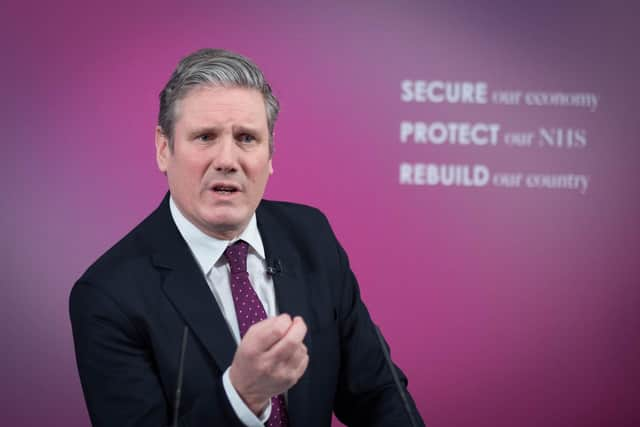Populism has had its day. With SNP and Tories out of ideas, Labour must offer vision of real hope amid the cost of living crisis – Barrie Cunning
There is no denying that Scottish politics is at a turning point with the Scottish Labour party in pole position to significantly increase its vote share and elected representatives to Westminster come the next general election, likely to take place in October next year. But the key thing to remember is that politics is about people and it’s about taking people on a journey which must offer a clear vision of hope and change. It’s also about managing the expectations of the British public – more so given what happened under the previous Truss administration, which I’m sure we can all agree must never be repeated.
One of the key factors that has resulted in this turning point is the fact that politics in Scotland has stagnated to the point that people are switching off, and this happened long before Nicola Sturgeon stood down as SNP party leader and First Minister. Political debate and discussion have long been about the constitution to the point that Scotland’s domestic agenda has suffered, resulting in various sectors having little confidence in the current Scottish Government’s ability.
Advertisement
Hide AdAdvertisement
Hide AdNicola Sturgeon’s departure was the catalyst that exposed the tensions and divisions within the SNP which continue to dominate, with a number of senior SNP politicians critical of the current coalition with their junior Green party partners. After years of populist politicians playing fast and loose with the running of the country on both sides of the border, we sadly now have a situation where the word “crisis” comes after the NHS, housing, business, or social care. And there are young people struggling to get on the property ladder, people not able to see a GP or dentist in a suitable time, and education in tatters with teachers at breaking point.
This means that Keir Starmer’s first task, should the Labour party win the next election, will be to turn things around – no easy task, but history has shown that when the country is on its knees it’s Labour that has the ambition and passion to put things back on track. Competency and credibility underpin Keir’s mantra and that’s resonating significantly with the British electorate.
He is right to have a frank conversation with the British public by attempting to manage expectations in terms of what Labour will be able to deliver in its first term in office, with the limited resources at its disposal. Underpinning this message is an emphasis on good governance – the days of populism are over. It’s time for a new government that has their sleeves rolled up and is ready to get on with the job of governing in the national interest, taking Britain in a forward direction with any spending commitments fully costed. This is what is required, given the current state of the country’s finances after Liz Truss and former Chancellor Kwasi Kwarteng’s failed experiment nearly bankrupted the country. Let that sink in when you’re next at the ballot box.
After 13 years of the Conservatives in power in England and 16 years of the SNP running the show in Scotland, our governments are showing signs of fatigue, a lack of ideas and a lack of ambition that has put both into a downward trajectory which will ultimately see them return to the opposition benches at both the UK general election and at the Scottish Parliament election in 2026.
Although the general election won’t take place for more than a year, the battlelines have been drawn and the key messages have been deployed. For the SNP and the Conservatives, it’s about damage limitation. Under Sunak, the Tories are adopting a populist, right-wing stance in a last-ditch effort to remain in office by wooing their core support base, concentrating on issues like immigration with the repulsive “stop the boats” slogan. The SNP are focussing their efforts on the constitution, with a renewed proposition about Scottish passports, based on a similar system to the one in the Republic of Ireland with a sub-narrative of free movement rights between Scotland and Ireland.


The question that needs to be asked is whether this will be enough for the SNP to keep a majority of seats in Scotland at the next election. I suspect that this strategy is limited in scope. As we are seeing in the by-election campaign in Rutherglen, the majority of people, including those who probably do support independence, don’t see it as a priority right now. With the cost-of-living crisis at the top of the priority list, people want a government that will make the right decisions in the interest of the people of Britain. If the SNP strategy chiefs were smart they would take a long-term view on independence, but I suspect their short-sightedness will be their downfall as the people of Scotland are now looking for more than a one-issue party.
Contrast that with the Labour party which is talking about the issues that matter to people and there is a clear division of tactics. The Rutherglen and Hamilton West by-election is Labour’s to win and very much the SNP’s to lose. The latter have been damaged by the ongoing Police Scotland investigation into the party’s finances and the resignation of Nicola Sturgeon, with mounting speculation about what is going to happen.
After so long in power in Scotland, you could argue that the SNP’s decline is just the natural way of things. But the reality is that the people of Scotland want a party that will address the cost-of-living crisis – and only the Labour party is up to the task of doing this.
Barrie Cunning is a former Scottish Labour party candidate and managing director of Pentland Communications
Comments
Want to join the conversation? Please or to comment on this article.